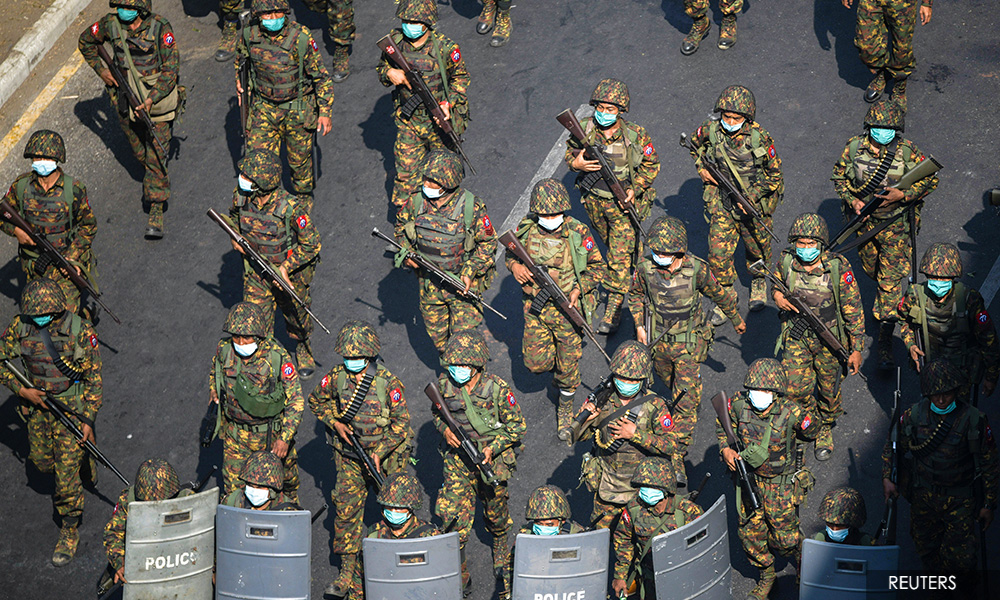Malaysia will support any effort to reconcile the differences among Myanmar’s leaders to avoid adverse consequences to the people and the state of Myanmar, said Foreign Minister Hishammuddin Hussein.
Hishammuddin said Malaysia also called for the prompt and unconditional release of detained political leaders in Myanmar, including Daw Aung San Suu Kyi, U Win Myint and their associates, and encouraged dialogue between parties concerned.
“We urge all relevant parties to continue exercising restraint from the use of violence against unarmed civilians. We are deeply concerned over the loss of innocent lives and injuries during the ongoing situation in Myanmar.
“It is our sincere hope that Myanmar will provide the necessary space for peaceful assemblies as well as freedom of speech and expression to be exercised by its citizens,” Hishammuddin said in his intervention at the Informal Asean Ministerial Meeting to discuss on the Myanmar political crisis, held virtually on Tuesday.
The meeting was chaired by Asean chairperson for this year, Brunei Darussalam. It was also attended by Myanmar’s Foreign Minister Wunna Maung Lwin, who provided a comprehensive briefing concerning the situation in Myanmar.
He said it is crucial for Myanmar to strive for a solution to the political crisis in a way that upholds the will and aspiration of the people of Myanmar.
Hishammuddin said while it is unquestionable that Myanmar has the prerogative on its domestic political matters, it is hoped that Myanmar would also consider the concerns raised by Asean member states constructively.
"On Malaysia’s part, we remain with the conviction that the resolution to the political deadlock in Myanmar is a domestic-led process. Our strong support for Myanmar’s democratic transition, peace process and inclusive economic development is unwavering. However, this cannot be at the expense of the common good of all in the Asean region," he said.

On Asean's consideration on the situation in Myanmar, he said that as Myanmar’s stability is integral to Asean’s regional integration and economic success, and that if the situation worsens, Asean will need to consider that this recurring situation in Myanmar is a setback towards regional peace, stability and prosperity.
Hence, the country needs to also continue cooperating with Asean member states to avoid being a fault line that could lead to possible instability in this region.
“Hence, we urge Myanmar to consider returning to the negotiating table and remedy the political crisis to avoid further escalation of tensions, which may invite intrusive foreign interventions in the Asean region.
“The situation in any one country should not be an impediment to Asean’s efforts to pursue and advance its interests internationally,” he said.
Hishammuddin also said Malaysia stands ready to galvanise efforts with other Asean member states in the provision of humanitarian assistance as needed by Myanmar.
In this regard, he said Malaysia hoped that Myanmar would ensure access to humanitarian assistance, for the health and well-being of its people.
At the meeting, Hishammuddin also made three proposals for the consideration of Asean and Myanmar in resolving the crisis; the first being that Asean may, at Myanmar’s invitation, provide democratic support through the establishment of a group of eminent persons or experts in electoral matters, to help bridge the discrepancies found in the last general elections.
Second, Myanmar may consider a proposal for the secretary-general of Asean and the chair of Asean to visit Myanmar and have access to all parties involved, and Asean foreign ministers can be apprised of their engagements at the earliest opportunity.
“Third, Malaysia is agreeable for Asean to continue engaging with its international partners collectively, or through the establishment of an Asean troika, on the situation in Myanmar. All recommendations made through these engagements will be shared with Myanmar for its practical implementation in its national context,” he said.
Meanwhile, Hishammuddin also expressed hope that the current situation in Myanmar will not have an adverse impact on the repatriation of displaced Rohingyas returning to Myanmar.
"Malaysia has been directly impacted by the Rakhine State crisis with the continued problem of irregular migration to Malaysia. We will continue to support efforts towards a safe, voluntary, and dignified return of displaced Rohingya to Rakhine State. We welcome Myanmar’s continued commitment on this matter," he said.
“We also look forward to the increased implementation of the recommendations of Preliminary Needs Assessment (PNA) led by the secretary-general and for the Comprehensive Needs Assessment to be conducted.
Last month, Prime Minister Muhyiddin Yassin and Indonesian President Joko Widodo (Jokowi) have jointly called for Asean to convene a special meeting to discuss the political situation in Myanmar, following the military coup.
The leaders jointly made the call in Jakarta in conjunction with Muhyiddin's official visit to Indonesia on Feb 5.
Myanmar's military launched a coup on the morning of Feb. 1, hours before the Parliament was set to sit, and had detained State Counsellor Aung San Suu Kyi, President Win Myint, and other senior members of the National League for Democracy (NLD).
The junta had also declared a one-year emergency and vowed to "take action" against alleged voter fraud during the November 8 general election, which the NLD party won.
- Bernama




No comments:
Post a Comment
Note: Only a member of this blog may post a comment.